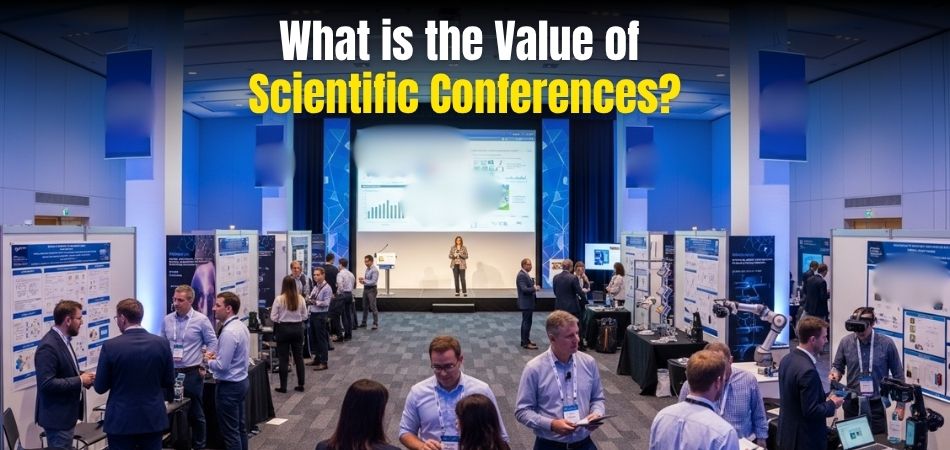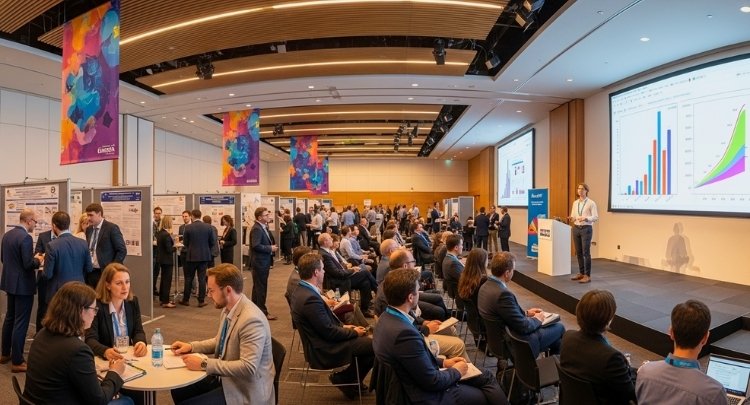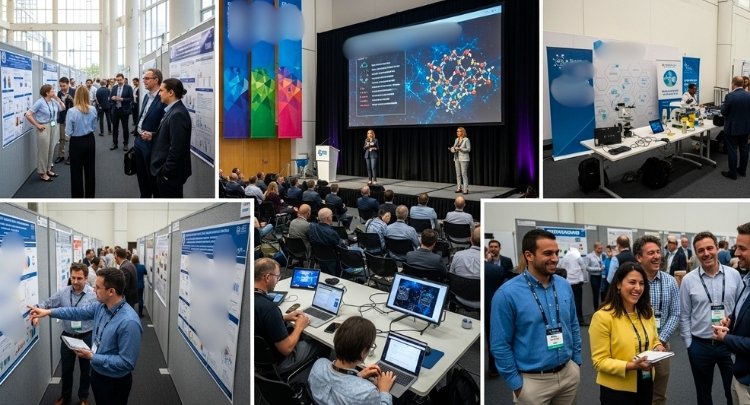Researchers gather at scientific conferences to discuss their research. They share new ideas, talk about their work, and learn from others. These meetings also help people see the latest tools in science, grow their skills, and find support for future projects. Most of all, they connect people with others who care about the same topics.
So, what is the value of scientific conferences?
Scientific conferences are valuable because they help researchers share new ideas, get feedback, and meet other experts. People learn about new science tools, build careers, and find chances to work together. These events also give inspiration, help improve skills, and sometimes lead to research funding or future projects.
In the rest of this article, we’ll explore why they matter so much and how they help science grow.
What is the Value of Scientific Conferences?
Scientific conferences are more than events; they are powerful spaces where knowledge, skills, and opportunities intersect. They allow researchers to share ideas, find inspiration, and grow their careers in meaningful ways. Let’s explore nine key reasons that show why these conferences hold such strong value.
Sharing Research Findings
- Researchers speak directly about their studies, offering details that written papers cannot fully capture in such depth.
- This process creates a stronger understanding of the subject, letting others build upon findings with clear direction.
Intellectual Discussions
- Conversations open the door to ideas researchers might never have considered when working alone in limited environments.
- Honest debate and critique push scientists forward, leading to fresh perspectives that improve both methods and results.
Collaboration
- Conferences connect people who share interests, helping them start new projects that grow beyond single institutions.
- These partnerships bring together unique strengths, making difficult research goals easier to reach and more impactful overall.
Professional Networking
- Meeting experts face-to-face allows young researchers to create lasting relationships with mentors and experienced leaders.
- These personal ties often guide career decisions, provide support, and help open doors to hidden opportunities.
Exposure to Innovations
- Attendees discover the newest technologies and methods, which can improve research speed and accuracy in their work.
- Staying updated like this ensures researchers never fall behind, even in fast-changing areas of scientific development.
Constructive Feedback
- Presenting work in front of peers helps scientists hear insights that challenge and refine their existing approaches.
- These comments often spark improvements, making research stronger, more reliable, and easier for others to replicate.
Career Development
- Speaking at conferences increases visibility, showing others that a researcher is serious and dedicated to their field.
- This recognition often leads to invitations for new projects, panel discussions, and future leadership opportunities.
Inspiration and Motivation
- Seeing creative work from different fields can refresh energy levels, encouraging researchers to push beyond daily challenges.
- This spark of motivation often leads to breakthroughs, as fresh ideas give shape to entirely new projects.
Funding Opportunities
- Conferences often include sessions where funders and sponsors connect with researchers looking to support innovative projects.
- These meetings can lead directly to grants, helping studies grow faster and gain credibility within the community.
Scientific conferences remain a driving force for science and careers, blending learning, collaboration, and real-world opportunities. Popular countries such as Canada, the United States, and Germany host important events every year, with upcoming conferences in Canada often standing out for their diversity and global participation. Attending such gatherings can fuel personal growth while also advancing the progress of science worldwide.
How Do Scientific Conferences Boost Research Collaboration?
People often come together in big events where ideas are shared, and fresh friendships begin to grow quickly. These gatherings feel exciting, filled with energy, and bring together people who share similar passions and goals. Scientists get a chance to meet others from many different places and backgrounds. Here’s how scientific meetings strengthen collaboration efforts:
Meeting New People
Conferences give scientists a chance to meet face-to-face with others who are working on similar topics. Meeting in person creates stronger connections compared to just sending emails or messages. These new contacts can later turn into helpful friends or trusted partners. Friendships built here often lead to future teamwork on different research projects.
Sharing Ideas
Scientists present their work in simple ways at these events so others can understand and discuss it. Talking openly makes it easier to ask questions and learn about different methods or approaches. When people hear new thoughts, they often find better ways to solve problems. This sharing builds a common ground for future teamwork.
Starting Projects
Sometimes two or more researchers discover they are studying similar issues but from different points of view. This makes them curious about joining forces to explore those ideas together. Conferences act as the perfect place to plan such work. A small chat today could become a strong project tomorrow.
Building Trust
Trust is important when people want to work together on something meaningful. Meeting in person allows scientists to know each other better. They can see how someone thinks and how serious they are. With trust, working together becomes smoother and more enjoyable.
Learning Together
Conferences often include sessions where people explain methods, show tools, or share their own experiences. By learning side by side, scientists understand things faster and in a clearer way. This shared learning creates a sense of teamwork even before official projects begin. Later, it makes working together feel natural and easy.
Getting Support
When scientists talk about their work, they often receive advice and helpful suggestions from others. This support helps them see their research from fresh angles. Encouraging words also give confidence to keep working hard. Support from peers makes future collaborations more likely to succeed.
Building Motivation
Watching others present exciting work fills scientists with energy and excitement for their own research. It inspires them to think bigger and try harder. They leave the event feeling encouraged and ready to explore new ideas. This spark of motivation often leads to group projects that bring out the best in everyone.
What Are the Career Benefits of Presenting at a Scientific Conference?
Standing on a stage and talking about your research can feel exciting and scary at the same time. The moment also gives you a chance to show your effort and ideas to others. That simple act of sharing can open doors that change your career in powerful ways. Here’s how presenting can boost your career:
Networking Connections
When you present, you meet people who care about similar subjects and want to talk about them. These meetings often lead to friendships that later turn into research partnerships or mentorship opportunities. Sometimes, experts in the field may even offer guidance or career advice. In some cases, job offers or invitations for future projects may come directly from these connections.
Helpful Feedback
Presenting allows you to hear what others think about your research, both the good parts and the weak points. This feedback makes your work stronger and easier for others to understand. Honest questions from different people can help you see your study in new ways. Over time, these improvements raise the quality and trust in your research.
Skill Growth
Speaking at a conference is great practice for important skills like communication, confidence, and time management. Every presentation helps you explain complex ideas in simple and clear language. These skills are not just useful in science but also in everyday professional life. The more you practice, the more natural and confident you become.
Recognition and Profile
Sharing your work in front of others makes people notice you and your ideas. This attention often leads to future invitations to speak at panels, join discussions, or write papers. Being recognized as someone with valuable ideas builds your reputation. Over time, it helps you stand out in your academic or professional community.
Career Opportunities
Presenting increases the chances of finding exciting roles and projects that match your skills. You may meet organizations or groups that want to support your research with funds or resources. These new chances can help you grow faster in your career. Many researchers agree that this is one important purpose of a scientific conference, as it creates real possibilities for professional growth.
Personal Growth
The experience of preparing and presenting helps build confidence and self-belief. It teaches you how to stay calm under pressure and speak clearly. Each time you present, you become more resilient and ready for bigger challenges. This growth strengthens both your personal and professional life.
Types of Scientific Conferences Offer Best Networking for Early-career Researchers
Starting a research career often feels overwhelming when trying to connect with experts and find the right opportunities. Conferences help young scientists meet people who share their interests and can guide their growth. These types of scientific conferences create unique chances to build relationships and networks:
International Conferences
Large international events bring together researchers from many countries, offering wide cultural exchanges and global perspectives for collaborations. These gatherings allow early-career scientists to meet leaders, discuss ideas, and learn professional standards. Networking opportunities here often extend beyond single subjects, promoting broader exposure.
Regional Conferences
Regional conferences gather scientists within specific areas, allowing for more personal conversations and building strong community ties. These smaller events create comfortable spaces for early-career researchers to interact directly with mentors. Such events often lead to local projects and closer professional relationships.
Specialized Workshops
Workshops focus on very specific topics, helping researchers dive deeper into specialized knowledge while connecting with experts. These settings encourage close collaboration through small group discussions and practical learning sessions. Young researchers often feel comfortable asking questions and seeking guidance here. Personal bonds formed at workshops usually last throughout careers and beyond.
Interdisciplinary Conferences
Conferences that bring together different fields encourage connections among scientists with unique perspectives. Early-career researchers benefit by learning new approaches outside their subject area. Such gatherings often spark creative projects that combine skills from many disciplines. Networking here broadens horizons, offering unexpected collaborations and exciting future opportunities.
Student Conferences
These conferences provide platforms designed mainly for students to share work, practice speaking, and connect with peers. Young researchers feel less pressure when presenting in front of similar-level audiences. Mentors often attend to offer guidance and feedback. Friendships and collaborations formed here frequently continue into later professional stages.
Industry-focused Conferences
Industry-focused events connect young scientists with businesses, opening opportunities for applied research partnerships and job placements. Networking with professionals from the industry provides fresh perspectives on science applications. These connections help researchers understand how their studies fit into real-world needs. Many career breakthroughs begin with conversations at industry-driven conferences.
Virtual Conferences
Online conferences remove travel barriers, making networking easier for those with limited resources. Chat features, breakout rooms, and online discussions create connection opportunities. Early-career researchers can meet mentors from around the world without leaving home. Virtual conferences increase inclusivity and still provide valuable networking opportunities.
Tips to Get the Most Out of the Value of Scientific Conference
Attending a scientific conference can feel exciting, but it also requires planning to truly gain the most benefits. These events are filled with opportunities for learning, meeting new people, and finding ideas for future projects. With the right approach, every session can help improve your knowledge and career.
Prepare in Advance
- Study the conference program early to select key talks that match your interests and support your research goals.
- Create a personal schedule that balances different sessions while leaving space for unexpected opportunities or last-minute discussions.
Engage Actively
- Ask thoughtful questions during talks to show interest and create meaningful discussions with both speakers and attendees.
- Join workshops, panels, and poster presentations to learn new skills and expand your scientific perspective even further.
Network Strategically
- Introduce yourself confidently, explain your work briefly, and exchange contact details to keep future conversations alive.
- Attend social gatherings, lunches, or informal meetups where relaxed conversations often turn into long-lasting professional friendships.
Use Technology
- Take advantage of event apps to track sessions, speakers, and updates, keeping yourself organized and fully informed.
- Share highlights on social media, using hashtags to connect with others and join wider event conversations online.
Reflect and Note
- Write key ideas from talks immediately, including speaker names and context, to avoid forgetting important details later.
- Review your notes after the event, and identify which ideas or contacts can help improve your research path.
Balance Your Schedule
- Include breaks in your plan to recharge, ensuring you stay sharp during important discussions and presentations later.
- Avoid rushing between nonstop sessions, because tiredness reduces your focus and lowers the quality of learning gained.
Present Effectively
- If presenting, practice in advance to explain your work clearly, while preparing for questions with short, thoughtful answers.
- Design slides or posters with clear visuals, making it easier for your audience to understand and remember your research.
Explore Sessions
- Attending different scientific conference sessions and activities helps you discover topics outside your main research area.
- These diverse experiences often spark creative thinking, offering unexpected ideas that improve your projects in surprising ways.
Follow-Up and Grow
- Email new contacts quickly after the event to thank them and suggest continuing the discussion on shared topics.
- Share useful takeaways with colleagues, showing initiative while keeping the knowledge from the conference alive and relevant.
Frequently Asked Questions
Scientific conferences bring people together to share, learn, and collaborate in meaningful ways. Many students and professionals often wonder about the hidden benefits of attending. These FAQs answer common questions and highlight why such events are so valuable.
How Do Conferences Inspire Young Researchers?
Conferences expose young researchers to exciting new ideas, encouraging them to think creatively about their own projects. Seeing experienced professionals present builds motivation and confidence. These experiences often push students to dream bigger and explore bold research directions.
Why Are Poster Sessions Important?
Poster sessions create informal spaces where researchers present work and discuss it closely with attendees. Unlike large talks, they encourage more personal interaction. These conversations often provide insights, spark collaborations, and help early-career scientists practice explaining their research clearly.
How Do Conferences Promote Global Connections?
Many conferences bring together people from multiple countries, building links that stretch far beyond local research communities. Meeting international peers introduces new methods, perspectives, and ideas. These connections often grow into long-term partnerships that expand opportunities for global collaboration.
What Role Do Social Events Play?
Conferences include dinners, receptions, or informal meetups where real connections often start. These relaxed settings reduce stress and make networking easier. Friendships formed here often lead to future collaborations, making social activities just as valuable as scientific sessions.
How Do Conferences Support Teaching Skills?
By watching experts explain complex topics, attendees learn different ways of teaching and presenting. These experiences improve their ability to communicate science in classrooms or workshops. Over time, these lessons strengthen their teaching style and overall confidence with students.
Why Are Panel Discussions Valuable?
Panels bring together several experts with different perspectives on one subject. Attendees hear multiple views in one session, encouraging broader thinking. These discussions often reveal new challenges, solutions, or research gaps that inspire attendees to explore deeper investigations.
How Do Conferences Boost Research Visibility?
Presenting at a conference allows researchers to showcase their work to a wider community. This visibility leads to recognition, invitations, or collaborations. Even attending helps researchers stay visible by asking questions, joining discussions, and actively engaging with other participants.
Why Do Conferences Matter for Future Trends?
Conferences often reveal upcoming research directions and technological developments before they appear in journals. Attendees learn about shifts in focus within their field. Staying ahead of these changes helps researchers plan better, ensuring their work remains relevant and impactful.
Bottom Lines
Scientific conferences help people learn, share, and grow together. They bring researchers into one space where new ideas are exchanged. These events also give confidence, improve skills, and create chances to meet people who can support future work.
The true meaning of what is the value of scientific conferences is found in these moments of connection, learning, and inspiration. A small talk, a friendly chat, or a fresh idea can change someone’s path. By attending, researchers keep improving themselves while also helping science move forward in ways that matter to the world.








